In the Press
 Yep, pretty busy lately. I hope to have a book announcement soon, though.
Yep, pretty busy lately. I hope to have a book announcement soon, though.
I was asked to write a short opinion piece for New Scientist on the problem of filtering our reality, based on the success of the "Here Active Listening" system on Kickstarter. The piece is online, but sadly for now behind a paywall. This excerpt should give you a taste:
Critics have also noted an implicit class element in paying for the ability to block out other people's lives. This ambivalence will only grow as the technology improves. Political protests, styles of music, and even specific voices or words could be blocked or altered as digital processing becomes more powerful.
The desire to filter out what we find disturbing or unwelcome isn't new. In the online environment, it is possible like never before to repel opinions, ideas, or even facts that don't match our world views. The "real world" has been the stubborn holdout, confronting us with things that we may find insulting, offensive or blasphemous. That's about to change.
For those of you who have followed my exploration of the "Participatory Panopticon" concept, these conclusions are unsurprising. What is a bit more startling -- at least to me -- is that the first real reality filtering technology will affect what we hear rather than what we see.
This week also sees the publication of an article in Business Insider about the impact of self-driving vehicles, consisting entirely of an interview with me. This came as a bit of a surprise; the interview was actually done as a discussion about the Elon Musk Hyperloop concept, but it looks like the author/editor decided to shift the focus. No complaints here, except that the author quoted me accurately in a stream-of-words bit which included both a mis-statement and the immediate correction. If my main complaint is being quoted too accurately, I'll let it slide.
The full article is online (and only online, I believe), but here's an excerpt:
"It is going to be a more cultural shift even more than a technological shift because we have this romantic culture around cars and we are going to look back at that in the same kind of wistful way that we looked back at the relationship people had with horses," Cascio said.
"You will probably have school girls with all kinds of model cars around the room instead of model horses. You will have people who really enjoy personally owned cars, but for the same reason people own horses today. It's not a utility; it's something that is a romantic hobby."
That school girls with model cars around the room bit was a joke; I should really stop trying to make tongue-in-cheek references in interviews.





